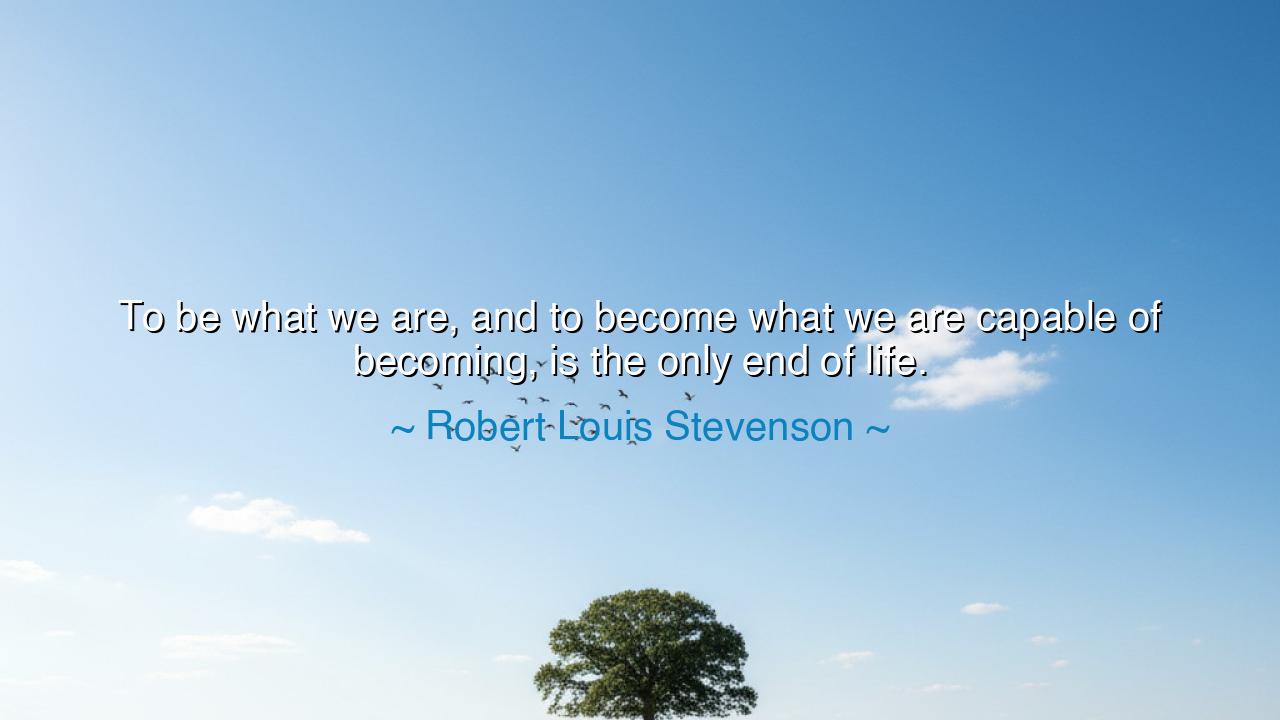
To be what we are, and to become what we are capable of becoming
To be what we are, and to become what we are capable of becoming, is the only end of life.






The words of Robert Louis Stevenson, “To be what we are, and to become what we are capable of becoming, is the only end of life,” resound with the grandeur of eternal wisdom. In them lies a truth as old as humanity itself: that the purpose of existence is neither riches, nor fame, nor fleeting pleasures, but the full unfolding of the self. To be what we are is the call to authenticity, to strip away masks and illusions, and to live faithfully to the truth of one’s own soul. To become what we are capable of becoming is the call to growth, to labor, to aspire toward the highest within us, refusing to remain bound by fear or idleness. This dual command—authenticity and transformation—is, in Stevenson’s words, the only end of life.
To live without authenticity is to live a shadow-life, mimicking others, seeking approval at the cost of one’s own essence. And to live without striving is to waste the seed of greatness planted within each soul. Stevenson reminds us that the noble path is not one of passive existence, but of active becoming. Life is a river that flows toward the sea; to dam it with fear or indifference is to stagnate. To open oneself to its current is to discover new horizons of strength, wisdom, and beauty.
The ancients, too, taught this lesson. In the temples of Delphi was inscribed the command, “Know thyself.” To know oneself was the first step—to be what you are, not what others imagine you to be. Yet the philosophers also taught that man is not fixed, but in motion, a creature called to transcendence. Aristotle spoke of entelechy, the realization of potential—the acorn becoming the oak, the child becoming the sage. Stevenson’s words echo this ancient wisdom: life’s meaning is found not in standing still, but in the journey from seed to flowering, from what we are to what we may yet become.
History bears witness to this truth. Think of Abraham Lincoln, born in poverty in a log cabin, unlettered and obscure. He began by being what he was—a man of honesty, humility, and perseverance. Yet he did not stop there. Through relentless learning and moral courage, he became what he was capable of becoming: a leader who could preserve a nation in its hour of darkness. His life proves that the greatness of humanity is not in birth, but in the courage to grow beyond one’s beginnings, while staying true to one’s essence.
The heart of Stevenson’s teaching is both humbling and exalting: every soul carries within it a destiny, a potential waiting to unfold. But this unfolding requires two acts of courage—the courage to accept who we truly are, and the courage to strive toward who we might be. To deny our essence is cowardice; to refuse our growth is sloth. But to embrace both is to fulfill the very end of life. This is the path of integrity and transformation, the way of the noble spirit.
The lesson for us is clear: do not waste your days chasing after lives that are not your own. Do not measure yourself by the illusions of others. Instead, look within, find your truth, and live it. Yet do not grow complacent—seek always to rise higher, to refine your gifts, to expand your heart. For life is not a stagnant pond but a rising flame, and the one who refuses to grow extinguishes his own light.
Practical actions follow. Spend time in reflection, asking: who am I truly, beneath masks and fears? Then ask: what is the highest version of myself I can yet become? Each day, take one step toward that higher self—whether in learning, in virtue, in service, or in creation. Hold fast to authenticity, yet never cease striving. In this way, when the end of your days comes, you will not lament what might have been, but rejoice in the fullness of what you became.
Thus Stevenson’s words endure like a beacon: “To be what we are, and to become what we are capable of becoming, is the only end of life.” Let them guide you as a law of the spirit—that the meaning of life is not outside of you, but within you, in the seed of your being and the fruit of your becoming. To be, and to become—this is the sacred journey, the heroic calling, the eternal purpose of every soul that walks the earth.






AAdministratorAdministrator
Welcome, honored guests. Please leave a comment, we will respond soon